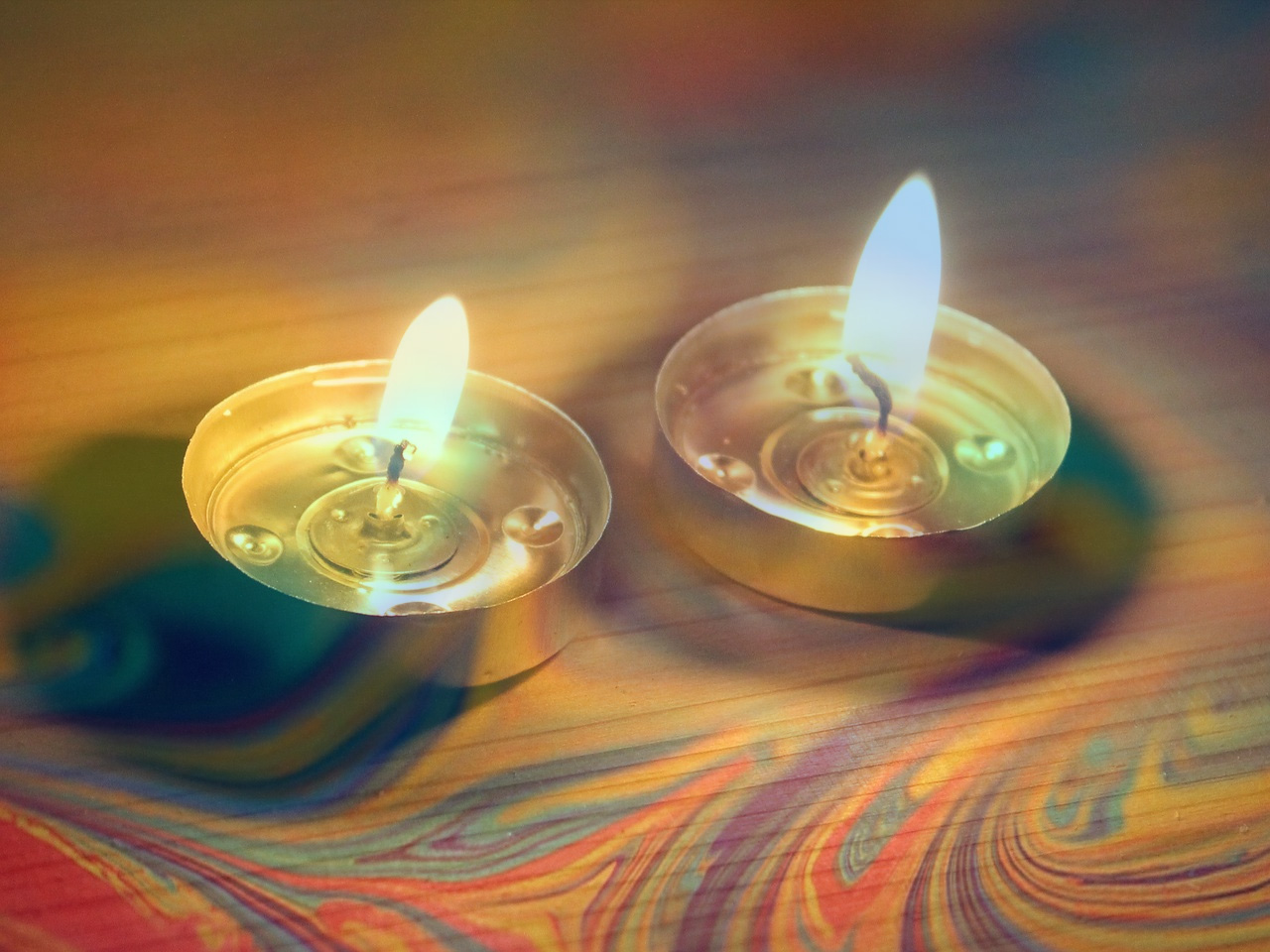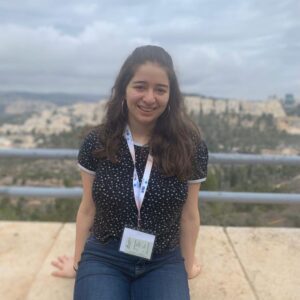When I was a kid, I loved Kabbalat Shabbat. I loved the rituals, the symbolism, and the singing. I loved when it was my turn to be the Shabbat monitor at school and I got to stand next to the papier-mache flowers and Zommick’s egg challah. There was always the sweet sticky smell of grape juice and other special treats. My classmates and I sat in a circle on the floor with our prayer booklets, passing the class mascot, a stuffed lemur, to the next kid after each song.
I hated that there was no Kabbalat Shabbat at home. The shabbat magic died as I walked out of school and boarded the bus on Friday afternoons. I went to a Jewish Day School, but my family was secular. There was no Jewishness at home, no rituals, songs, or prayers. There was only rushed pepperoni pizza slices and a retreat to respective bedrooms. It was no different from any other night. Sometimes, as a little runt of a kid, I tried to get my family together on Friday nights. I pulled the worn, rusted silver candlesticks out of the drawer and directed my parents in the blessings. But it didn’t stick. It wasn’t a habit, a tradition, a predictable part of family life.
As I grew up, Shabbat lost its magic for me. In my last years of Jewish Day School, I scoffed and rolled my eyes at the Hebrew teachers along with everyone else. When a student asked a question about religion, the answer was always “because God said so.” When I wanted to complicate the rules given to me, I was told to be quiet and listen. It’s like this because it’s like this and that’s it. Just do as you’re told. Bow and pray to a sexist God you don’t believe in. In-class Kabbalat Shabbat on Friday afternoons became just another inscrutable rule imposed on me. My classmates and I took to drawing pentagrams on the walls in invisible ink. Two boys in the class pantomimed devout prayer, swaying and moving their lips, to draw out our afternoon prayer and delay Hebrew class.
After graduating from my day school in the eighth grade, I went to a public high school. I had no Jewish friends there. Religion never came up, so I never brought it up. The mask of secularism fit me comfortably enough. I was even embarrassed to say I was Jewish, to admit that a part of me still believed in the divine. I buried my spiritual self beneath AP textbooks and reality TV.
In my Freshman year of college, I spent my Friday nights eating fries and drinking cheap alcohol with other students I labeled as friends too quickly. Even though I went to Brandeis, a college where about half of the student body is Jewish, I had a hard time fitting into Jewish life and making Jewish friends. My first week on campus, I tried a Hillel Shabbat dinner. I didn’t know anyone, and I went with hopes of making friends. No one in the giant windowless room talked to me. My attempts at polite conversation were quickly shut down as my tablemates caught up with old friends and traded inside jokes. I did not go back.
My only Jewish friend kept asking me to come to a Chabad Shabbat dinner with her, and late in the fall semester I agreed. These were smaller than the campus Hillel functions and held in the home of the local Chabad family. I sat tensely in my dress, trying to tug it below my knees, but the charm of the candlelight and somewhat strong-armed group singing quickly warmed me up. I went back again with less complaints. It was nice to have a routine again, to gaze into the flame of the candles. But I was never able to come out of my shell. I had to wear clothes that didn’t feel like me and sing songs about a portrayal of divinity I didn’t believe in. I still longed for my Jewish community, a place where I really felt I belonged.
I don’t remember how it happened, but a few weeks before finals, I stumbled into a Reconstructionist Kabbalat Shabbat service. I was so anxious I came half an hour late on purpose and sat silently in the back corner. I looked around. People were wearing jeans and sitting in a circle. Some had tambourines. There was a young woman with dirty blonde hair and a denim jacket playing guitar. Even though I was so shy I couldn’t pray out loud or talk to anyone, I broke down crying during the shema. It was the first time I had said it in four years.
I went back to the Brandeis Reconstructionist Organization (BRO) eagerly my sophomore year and joined the board. BRO became my center of Jewish life. It was a small community where I felt welcomed as I was on that day – in jeans or a dress, singing along loudly or mumbling under my breath, atheist or angry at the divine or uncaring or adrift. I found my campus Jewish community.
Then COVID hit. Like millions of college students, I had to drop everything and move back home. Shabbat dinners had become essential to me, and I made my case for quick blessings and actually sitting together at the table just one night a week. Well, I didn’t really ask. I pulled out the big guns that always work in my house: “This is important to me,” I said to my parents.
My parents and brother agreed to try it. The first week, my dad said Kiddush wearing his reading glasses, holding the booklet an arm’s length away and squinting. My mom said HaMotzi, stumbling midway through the blessing and looking to me for guidance. It all felt surreal, like something out of my childhood dreams.
To my surprise, Shabbat dinners became a predictable and grounding occurrence every week. My mom cooked, I set the table, and my dad and brother cleaned up after the meal. Sometimes it was twenty minutes of near silence then everyone scurried off to their bedrooms again. Sometimes it ended in explosive arguments and someone finishing their plate an hour or two later in the kitchen. But sometimes it worked. Sometimes we ate and joked and laughed, lingering at the table long after the meal was over. Shabbat dinner gave us a reason to keep trying to find ways to be together. It wasn’t perfect, but it was right for my family.
I don’t know why it worked now and not when I was a kid. The strangest part is that they kept doing it after I moved back to Brandeis for my Junior year. Somehow the time was right and it stuck, even when I was hundreds of miles away negotiating my spirituality in a hybrid pandemic semester. Maybe it was the craving for human connection we all had during the pandemic. Maybe it was the extra need for routine and certainty in frightening and unpredictable times. Maybe it was just that my brother and I had grown up and my parents were less busy with the tasks of raising us. Maybe they knew I needed a little help, a little accommodating, after I had been uprooted from the campus life and Jewish community I so enjoyed.
Sometimes I feel a twinge of anger knowing that they carry on with Shabbat dinners without me. I needed that grounding of ritual and routine so much more at seven than I do at twenty. I craved stability and the magic of symbols I was too young to probe. But maybe it’s better this way. I had to struggle and ignore Shabbat for years before coming back to it in my own way. If I had grown up with it, maybe it would have felt forced. Maybe I never would have gotten past my skeptical middle school self. Now, I look forward to Shabbat as a time to relax, let go of the pressures of productivity, and connect to myself and my community. And I look forward to continuing and deepening my family’s Shabbat traditions when I move home for the summer.

